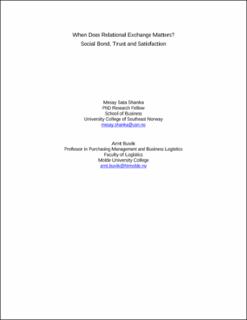When does relational exchange matters? Social bond, trust and satisfaction
Peer reviewed, Journal article
Accepted version
Permanent lenke
https://hdl.handle.net/11250/3031101Utgivelsesdato
2019Metadata
Vis full innførselSamlinger
- Artikler [412]
- Publikasjoner fra Cristin [429]
Originalversjon
Journal of Business-to-Business Marketing. 2019, 26 (1), 57-74. 10.1080/1051712X.2019.1565137Sammendrag
Purpose: The extant literature on business-to-business relationship has shown that trust, relationship duration, and social bond are the key drivers of relationship satisfaction. Notwithstanding, studies on the examination of when and why these variables translate into successful relationship are still scarce and need further exploration. This research investigates the conditions under which trust and social bonds influence satisfaction in a business-to-business relationship. Design/methodology/approach: The data were collected from 159 footwear producers using a structured questionnaire. Four hypotheses were developed and tested using hierarchical multiple regression. Findings: The authors found support for all hypotheses. Social bonds and longevity are crucial in enhancing supplier relationship satisfaction. Likewise, the role of social bonds in inducing supplier satisfaction heightens over time. However, the positive association between exchange partner trustworthiness and supplier satisfaction works well only in high degree of dependence situation. Research limitations/implications: The study was based on the report on monadic data and cross-sectional design. Future research should adopt longitudinal design to overcome the shortcomings. Theoretical implications: This study advances the social exchange theory (SET) by elucidating the condition in which social bonds and trust fail to produce relationship satisfaction. Social bonds fail to enhance relationship satisfaction at the beginning of the relationship. Moreover, trust alone cannot be good enough to boost relationship satisfaction in a lose dependence context. Managerial implications: This study acclaimed a relationship-driven approach as the best choice for those firms who aspire to build a good relationship with their exchange partner. Managers should understand how and when to develop a strong social relationship with their trading partners, and recognize the situations in which to deal with honest and fair business partners in an exchange relationship. Originality/Contribution: This is one of the very few studies, which have been conducted to investigate the conditions under which the relational variable influences satisfaction in a businessto-business relationships context. It expanded the boundary of the current literature as it investigated the moderating role of relationship duration and dependence in the relationship between relational constructs and relationship satisfaction. Keywords: Social exchange theory, social bonds, trust, relationship duration, relationship satisfaction, industrial marketing, business marketing
